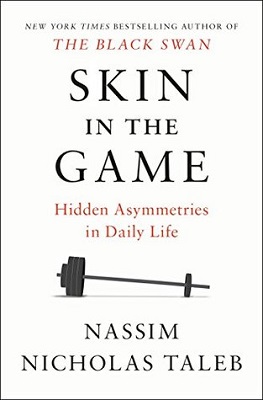I recently finished Taleb's book Antifragile: Things That Gain From Disorder. I previously read his Black Swan and Fooled by Randomness.
Antifragile is a word he made up. Many things are fragile, they break easily. Many things are robust, they can take a pounding and probably survive. Something antifragile takes a pounding and improves and he says there was no word for it. He gives a couple illustrations. The human immune system is stronger after an infection as it is better able to fight that infection going forward. The airline industry, after an accident the problem is discovered and fixed and is better off.
The book is very intriguing. The author's politics is confusing, some populist mixed with classic libertarian and far left added in. I will post different ideas from it in responses to this one. But this one will cover government.
Taleb first loves small government, though small meaning close to home. His ideal government is Switzerland's, where he says more people can name the US President than the Swiss President. All real power lies in the Cantons. The Swiss Federation has little power.
I should mention, his ideal systems of any type are small and noncomplex. Small systems are less likely to be squeezed, and less fragile over all. Think of a drought and the survival attempts of mice vs elephants. Complex systems just break more often. Keep things as small and simple as possible.
This raises a problem, the big government like America's is too large and complex to effectively spy on its citizens. A smaller power structure like Switzerland's does not have the bureaucracy preventing it from being effective at spying. But it is a risk he is willing to take.
So he has some ideas for the US system. One, if a corporation ever takes bailout money from the government no one in that corporation could ever be paid more than the highest US civil servant.
Another idea, if one works for a US regulatory agency their salary in the private sector is again capped at the highest salary in the government. Government work should attract people wanting to serve the public good not be a stepping stone to exploit.
His area of expertise is risk. He believes virtually no one understands risk. As a result, he thinks we should min/max risk. He believes banks should be nationalized. Too many banks fail for them to be safe. But hedge funds should be totally unregulated. People should be allowed, if not encouraged, to take risks. In fact he describes ideal investment strategy as 90% totally safe and 10% in a wide variety of high risks. He believes "moderate" risk investments do not exist, they are only labeled such by people who do not understand risk. So government should encourage risk in investing.
Antifragile is a word he made up. Many things are fragile, they break easily. Many things are robust, they can take a pounding and probably survive. Something antifragile takes a pounding and improves and he says there was no word for it. He gives a couple illustrations. The human immune system is stronger after an infection as it is better able to fight that infection going forward. The airline industry, after an accident the problem is discovered and fixed and is better off.
The book is very intriguing. The author's politics is confusing, some populist mixed with classic libertarian and far left added in. I will post different ideas from it in responses to this one. But this one will cover government.
Taleb first loves small government, though small meaning close to home. His ideal government is Switzerland's, where he says more people can name the US President than the Swiss President. All real power lies in the Cantons. The Swiss Federation has little power.
I should mention, his ideal systems of any type are small and noncomplex. Small systems are less likely to be squeezed, and less fragile over all. Think of a drought and the survival attempts of mice vs elephants. Complex systems just break more often. Keep things as small and simple as possible.
This raises a problem, the big government like America's is too large and complex to effectively spy on its citizens. A smaller power structure like Switzerland's does not have the bureaucracy preventing it from being effective at spying. But it is a risk he is willing to take.
So he has some ideas for the US system. One, if a corporation ever takes bailout money from the government no one in that corporation could ever be paid more than the highest US civil servant.
Another idea, if one works for a US regulatory agency their salary in the private sector is again capped at the highest salary in the government. Government work should attract people wanting to serve the public good not be a stepping stone to exploit.
His area of expertise is risk. He believes virtually no one understands risk. As a result, he thinks we should min/max risk. He believes banks should be nationalized. Too many banks fail for them to be safe. But hedge funds should be totally unregulated. People should be allowed, if not encouraged, to take risks. In fact he describes ideal investment strategy as 90% totally safe and 10% in a wide variety of high risks. He believes "moderate" risk investments do not exist, they are only labeled such by people who do not understand risk. So government should encourage risk in investing.





